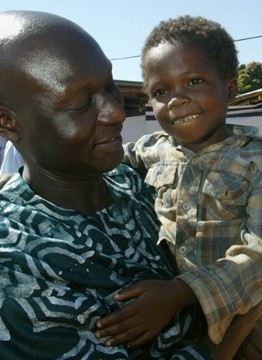 |
| Olara Otunnu and child |
Otunnu had the opportunity of going to high school, college, and then university in Kampala, Uganda. Intelligent and eager to make a difference in the world, he earned an Oxford University Overseas Scholar followed by a Fulbright Scholarship to Harvard Law School. Afterwards, he practiced law in New York before becoming an Assistant Professor of Law at Albany Law School.
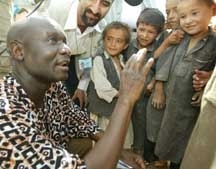 |
| Otunnu and children from Afghanistan |
Otunnu was a student activist during his university years as president of the student's union, when Edi Amin had a terrible grip on his unfortunate subjects. After earning his degrees, Otunnu worked as a lawyer as well as a skilled diplomat; his awareness of the bleak plight of the children in his beloved Uganda compelled him to devote his life to improving their lives. When offered the position of United Nations under-secretary general and special representative for children and armed conflict, it was a perfect fit. He fulfilled this position from 1997 to 2005.
Under his passionate and charismatic leadership, the United Nations crafted a comprehensive system of rules, called Resolution 1612 of 26 July 2005, in which an international monitoring and reporting system was established. The system "documents abuses against children, seeks to identify and publicly list offending parties responsible for abusing and brutalizing children, and seeks to bring these offenders into compliance with international laws and standards, including through the imposition of sanctions."
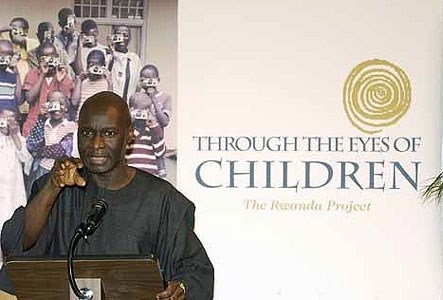 |
| Olara Otunnu speaking about the Rwanda Project |
"from Colombia to Sierra Leone, from Sri Lanka to Sudan and Uganda, from Burma to Angola.
Compelled to become instruments of war, to kill and be killed, child soldiers are forced to give violent expression to the hatreds of adults.
It is not just the child combatants who are affected, but the girls who become 'wives,' the youngsters who have to cook for the troops, be messengers or spies."
Report to the United Nations by Olara Otunnu
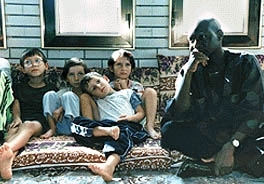 |
| Youth Ambassadors for Peace |
Otunnu spoke at the World Council of Churches, February 2006, where he laid out the progress made in the United Nations regarding this seemingly intractable affliction. After tireless observation, research and planning, Otunnu may have cracked the conundrum of why this urgent problem has persisted for so long, with so little action taken. He broke the problem down into these active steps toward hope.
Simply put: Otunnu laid the groundwork by speaking out against the shame of treating children this way; he brought organizations together to take action; he decided how to assist government agencies to transform from talk to action (the most difficult step of all); the first concrete step was in publicly shining the spotlight on those who transgress; specific action plans and deadlines for ending the violations were implemented; in the event of noncompliance, the "Security Council will consider targeted measures against those parties and their leaders, such as travel restrictions and denial of visas, imposition of arms embargoes and bans on military assistance, and restriction on the flow of financial resources."
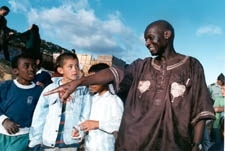 |
| Otunnu and children in Columbia |
Olara Otunnu has left an immensely important legacy during his United Nations sojourn - one that will save the lives and futures of thousands of children. Today, his work continues through the LBL Foundation, whose mission is to encourage investing in the education of children and youth, as the "most effective way to facilitate overall recovery and development in a war-torn society."
Page created on 8/11/2010 3:52:41 PM
Last edited 1/6/2017 6:15:22 PM
